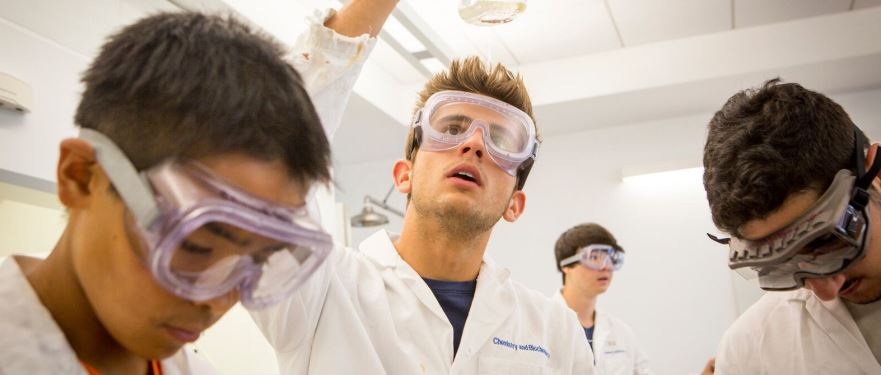Chemistry
What Is Chemistry?
LMU's Chemistry major helps students understand the empirical nature of the science while gaining intellectual mastery of chemistry and developing practical experimental skills.
Majors gain hands-on experience in traditional synthetic and analytic bench chemistry, utilizing the latest methods and techniques. Students benefit from small class and laboratory sizes, daily personal contact with faculty and staff, and operation of chemical instrumentation.
Students learn a broad introduction to the field of chemistry including atomic theory, chemical nomenclature, chemical equations and reactions, thermochemistry, electrochemistry, and acid-base chemistry. Students also study biochemistry, organic chemistry, physical chemistry, and analytical chemistry. Many students take elective courses in inorganic chemistry, food chemistry, wine chemistry, forensic chemistry, and other advanced courses.
What Do Chemistry Majors Do?
Chemistry majors learn and work in laboratories for organic research, instrumentation, and physical chemistry. The Chemistry Department has an extensive selection of modern instrumentation that is utilized in undergraduate teaching labs and research projects.
Chemistry majors enjoy access to advanced preparation and separation instrumentation, thermal analysis, and spectroscopic instruments. In addition to ordinary laboratory equipment, students have the opportunity to work with an alphabet soup of instruments such as a high-speed centrifuge, HPLC, GC, GC-MS, DSC, FT-IR, UV-Vis, flame and furnace AA, fluorometer, and FT-NMR.
Is This Major Right for You?
You might be a Chemistry major if you:
- Seek a career in science
- Enjoy molecular-level design
- Enjoy experimentation
- Like working with high-tech equipment
- Want to know how and why things function
About Our Faculty
Our faculty members are experts in fields such as amyloid chemistry, organic synthesis and mechanisms, protein structure, metal ions in biochemistry, environmental and atmospheric chemistry, computational and theoretical chemistry, nutritional chemistry, pedagogical research to improve science education, and catalyst design for alternative energy. Faculty members are active scientists who include undergraduate students in their research projects and have experience in science policy, nonprofit organizations, and the chemical industry. Research involving undergraduate coauthors is presented across the country and internationally at conferences and in articles for books and academic journals such as Biochemistry and Molecular Biology Education, Surface Science, Atmospheric Environment and Journal of Peptide Science.
About Our Students and Graduates
LMU students majoring or minoring in Chemistry prepare for immediate employment in the field of chemistry and for graduate study. The major is excellent preparation for those planning on attending medical, dental, and other health professional schools.
Our graduates work as teachers, researchers, inventors, writers, industrial laboratory managers, and forensic analysts. Graduates work in the pharmaceutical and financial industries, in patent law, and in other professions in which chemistry serves as a foundation.
Representative Courses
Our courses have included:
- Biochemistry I & II
- Introduction to Chemistry / Biochemistry Research
- Instrumental Analysis
- Organic Chemistry
- Wine Chemistry
- Physical Biochemistry
- Toxicology
- Environmental Chemistry
- Food Chemistry
- Advanced Inorganic Chemistry
- Cell Biology
- The Science in Science Fiction
- Forensic Chemistry
- Computational Quantum Chemistry
- Chemistry Teaching
- Independent Studies
